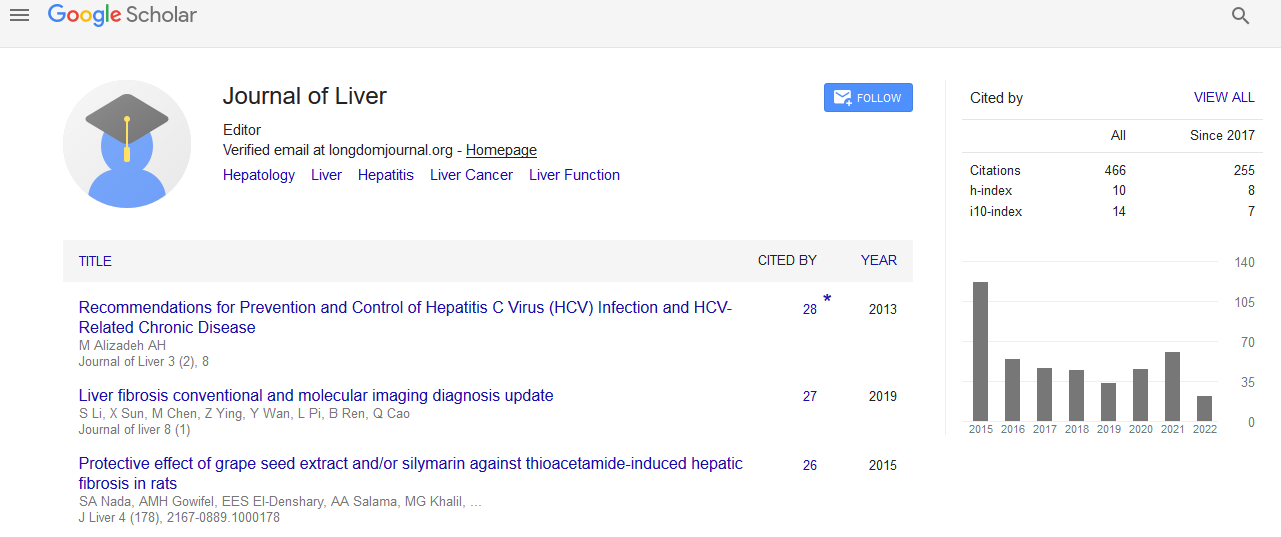PMC/PubMed Indexed Articles
Indexed In
- Open J Gate
- Genamics JournalSeek
- Academic Keys
- RefSeek
- Hamdard University
- EBSCO A-Z
- OCLC- WorldCat
- Publons
- Geneva Foundation for Medical Education and Research
- Google Scholar
Useful Links
Share This Page
Journal Flyer

Open Access Journals
- Agri and Aquaculture
- Biochemistry
- Bioinformatics & Systems Biology
- Business & Management
- Chemistry
- Clinical Sciences
- Engineering
- Food & Nutrition
- General Science
- Genetics & Molecular Biology
- Immunology & Microbiology
- Medical Sciences
- Neuroscience & Psychology
- Nursing & Health Care
- Pharmaceutical Sciences
Genetic polymorphisms of APOBEC3A/B may influence the risk of HBV related HCC via affecting viral mutations: Key steps to interpret cancer Evo-Devo
2nd International Conference on Hepatology
May 09-11, 2016 Chicago, USA
Guangwen Cao
Second Military Medical University, China
Posters & Accepted Abstracts: J Liver
Abstract:
The microenvironment of chronic inflammation promotes the evolution progression of hepatitis B virus (HBV) caused hepatocellularcarcinoma (HCC) by facilitating the generation and selection of viral and somatic mutation. We aimed to determine if that the family of apolioprotein B mRNA-editing enzyme catalytic polypeptide 3 (AOBEC3) bridge the chronic inflammation and HCC via inducing mutations. Three key single nuclear polymorphisms (SNPs) of APOBEC3A and B (rs2267401, rs5750717 and rs12628403) were genotyped in 1342 healthy controls, 330 HBV-clearance subjects, and 2846 HBVpositive subjects including 1182 HCC patients. HBV mutations in the previously defined genomic regions were determined by PCR amplification and sequencing. We found that rs2267401 (TG versus TT) significantly decreased HBV persistence. Variant genotypes of rs2267401 (TG+GG or TG versus TT), rs5750717 (all the variant genotypes versus wild type) and rs12628403 (CC versus AA) were associated with a decrease risk of HCC compared with healthy controls. rs5750717 variant genotypes significantly decrease the risk of HCC in the genotype B HBV infected subjects [GG versus AA: adjusted OR, 0.10; 95% CI,0.01-0.77] and the genotype C HBV infected subjects (AG versus AA: Adjusted OR, 0.45; 95% CI 0.28-0.72) compared with HCC free HBV infected subjects. AN rs5750717 were also related with the frequency of HCC telated HBV mutations (A1762T/G1764A). The interaction of rs2267401 variant genotypes with HBV preS1 start codon mutation and preS deletion significantly increased HCC risk in the genotype C HBV infected subjects. Thus, genetic polymorphisms of APOBEC3A/B may contribute to HBV clearance/persistence and affect HCC risk possibly via generating and interacting with the HCC related HBV mutations in Chinese populations.
Biography :
Email: gcao@smmu.edu.cn

